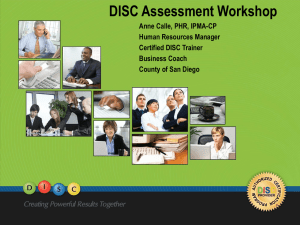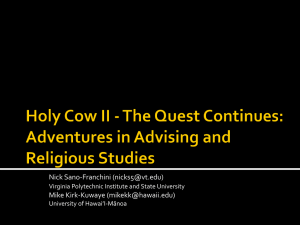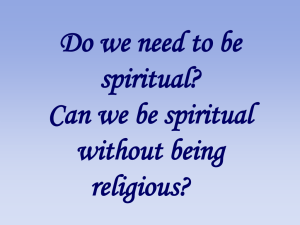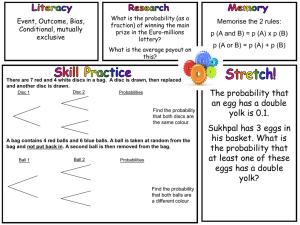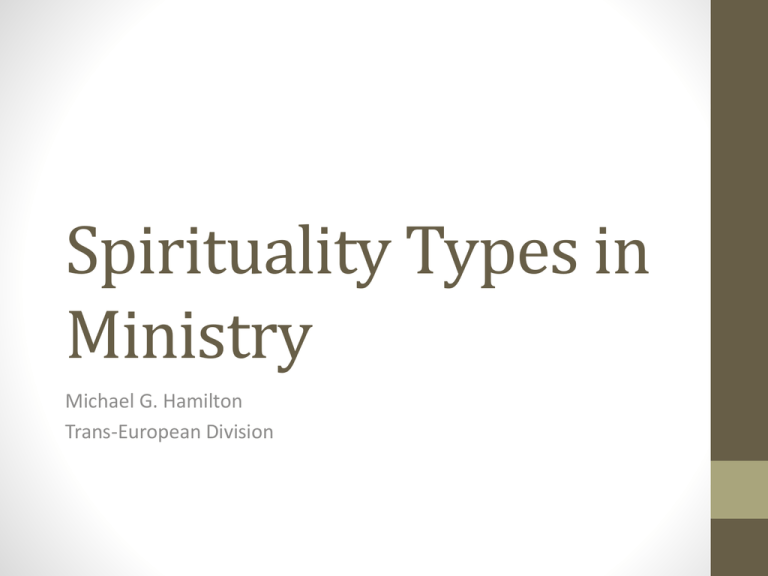
Spirituality Types in
Ministry
Michael G. Hamilton
Trans-European Division
What is Spirituality?
• ‘ruach’ -- breath, spirit, wind.
• ‘Pneuma’ -- breath, life, spirit, wind.
• ‘Pneumatikos’ -- spiritual (things relating to life)
• ‘Spirituality’ -- “That which gives quality to life”
What is Spirituality?
• Spirituality must be the initiative of God
• God is a spirit therefore spirituality is man's attempt to
understand the depths of God.
• The Bible suggests that spirituality has to do with worship
(John 4:26)
• Spirituality has also to do with growth. The goal to be reached
is godliness therefore spirituality is measured by the character
of God.
What is Spirituality?
• Mankind's aspirations are always beyond himself. We have
always sought to emulate characteristics of those we consider
to be greater than ourselves.
• To be truly spiritual we must first acknowledge the existence
of the living God, who himself is spiritual.
• The image of Christ is God's ideal for mankind's spiritual
search. To be truly spiritual we must first find out what Christ
is like. True Spirituality, then, is an experiential knowledge of
God implanted into the consciousness of mankind by exposure
to the revealed will of God.
For Effective Spirituality….
God entering ‘flesh’ effects genuine spirituality.
• Genesis 2:7 “The Lord God formed the man from the dust of
the ground and breathed into his nostrils the breath of life,
and man became a living being.”
• John 1:14 “The Word became flesh and made his dwelling
among us, …”
• Hebrews 2:14-18 “Since the children have flesh and blood, he
too shared in their humanity….”
When the breath (life) of God
enters man (flesh) again, it gives
quality of life.
What is Personality?
• A brief definition would be that personality is made up of the
characteristic patterns of thoughts, feelings and behaviours
that make a person unique.
• In addition to this, personality arises from within the
individual and remains fairly consistent throughout life.
Dictionary.com Definition
• “the sum total of the physical, mental, emotional, and social
characteristics of an individual”
• “the organized pattern of behavioural characteristics of the
individual”
Fundamental Characteristics
• Consistency - There is generally a recognizable order and
regularity to behaviours. Essentially, people act in the same
ways or similar ways in a variety of situations.
Fundamental Characteristics
• It impacts behaviours and actions - Personality does not just
influence how we move and respond in our environment; it
also causes us to act in certain ways.
• Multiple expressions - Personality is displayed in more than
just behaviour. It can also be seen in our thoughts, feelings,
close relationships and other social interactions.
P E R C E
THINKING J U D G I N G
SENSING
I V I N G
iNTUITION
FEELING
Jungian/Myers-Briggs Psychology
Four basic preferences that determine the way we relate
to our world and process the information received from
it.
I or E (Introversion or Extraversion) Determines our
preferred focus
S or N (Sensing or iNtuition) Preferred means of
receiving information
T or F (Thinking or Feeling) How the information is
processed
J or P (Judging or Perceiving) Relationship to the
flow of life
© Copyright 1994-2004 EXTENDED DISC INTERNATIONAL – All Rights Reserved
MBTI Preferences
Extraversion (E)
People who get their energy
or focus attention on the
outer world of people and
activity.
Attuned to external
environment
Prefers to communicate by
talking
Learn best through doing or
discussing
Sociable and expressive
Introversion (I)
People who focus on their
own inner world and
experiences. They get
their energy from reflecting
on their thoughts,
memories and feelings.
Prefer to communicate in
writing
Works out ideas by
reflecting on them
Private and contained
Learn best by reflection
© Copyright 1994-2004 EXTENDED DISC INTERNATIONAL – All Rights Reserved
MBTI Preferences
Sensing (S)
People who take in
information that is real and
tangible – what is actually
happening.
Oriented to present realities
Factual and concrete
Observe and remember
detail
Trust experience
Intuition (N)
People who take in
information by seeing the
big picture and focusing on
relationship and
connections between facts.
Oriented to future
possibilities
Focus on patterns and
meanings in data
Remember detail when they
relate to a pattern
Trust inspiration
© Copyright 1994-2004 EXTENDED DISC INTERNATIONAL – All Rights Reserved
MBTI Preferences
Thinking (T)
People who make decisions
by looking at the logical
consequences of a choice or
action.
Analytical
Use cause and effect
reasoning
Solve problems with logic
Fair – want everyone
treated equally
Feeling (F)
People who make decisions
based on what is important
to them and others
involved.
Empathetic
Guided by personal values
Assesses impact of decision
on people
Fair – want everyone
treated as an individual
© Copyright 1994-2004 EXTENDED DISC INTERNATIONAL – All Rights Reserved
MBTI Preferences
Judging (J)
People whose outer world
must be planned, orderly,
and well managed.
Scheduled
Systematic
Methodical
Try to avoid last minute
stresses
Perceiving (P)
People whose outer world
must be flexible and
spontaneous. They seek to
experience and understand
life rather than control it.
Spontaneous
Flexible
Casual
Feel energised by last
minute pressures.
© Copyright 1994-2004 EXTENDED DISC INTERNATIONAL – All Rights Reserved
Sixteen Basic Preferences
INTJ
INTP
INFJ
INFP
ISTJ
ISTP
ISFJ
ISFP
ENTJ
ENTP
ENFJ
ENFP
ESTJ
ESTP
ESFJ
ESFP
© Copyright 1994-2004 EXTENDED DISC INTERNATIONAL – All Rights Reserved
ATTITUDE
FUNCTIONS
INTROVERT
SENSING
EXTRAVERT
iNTUITION
ATTITUDE
THINKING
JUDGING
FEELING
PERCEIVING
© Copyright 1994-2004 EXTENDED DISC INTERNATIONAL – All Rights Reserved
Luke 2:52. “And Jesus grew in wisdom and
stature, and in favour with God and men.”
Jesus developed intellectually and physically,
spiritually and socially.
© Copyright 1994-2004 EXTENDED DISC INTERNATIONAL – All Rights Reserved
Personality type does not only determine
our preferences for acquiring knowledge on
the intellectual level and relate to our
environment on the social level, but it also
determines how we relate to God on the
spiritual level.
© Copyright 1994-2004 EXTENDED DISC INTERNATIONAL – All Rights Reserved
Spirituality Type S
Experience reality through the five senses. Concerned with
the data of present reality. Prefer known patterns of
worship using five senses. Future possibilities determined
by present realities.
Prayer very concrete and specific. Taking scripture
literally. Life of Christ a role model for behaviour and
practice. Need for experience (colours, emblems,
involvement, etc.) Imminence of God is experienced.
There is need to become aware of the presence of God by
developing our sensing functions through deliberate
practice of certain disciplines, e.g. meditation, fasting, etc.
© Copyright 1994-2004 EXTENDED DISC INTERNATIONAL – All Rights Reserved
Spirituality Type N
The ability to imagine a possible future – “What if…” They
value the unseen, the unheard and untouched. They
cherish hope. Proverbs 29:18, Vision is crucial.
Explorative worship is cherished. Need for creative
stimuli, e.g. poetry, music.
Intuitivist will use sensing data to launch into intuitive
future possibilities. They are not very attentive to sensing
present realities.
© Copyright 1994-2004 EXTENDED DISC INTERNATIONAL – All Rights Reserved
Spirituality Type N
Drawn to the transcendence of God.
Prayers based on future more than the present.
Quest for meaning and understanding.
Drawn to the mystery of God.
Search for symbols that feed the imagination.
Extraverted N’s—Good at inspiring others to greatness.
Introverted N’s wait for still small voice – prophetic
voice. Need to share the vision with others.
© Copyright 1994-2004 EXTENDED DISC INTERNATIONAL – All Rights Reserved
Spirituality Type T
Relies on principles of objective truth. Can be stern, firm,
critical, impersonal, etc. Thinkers may have strong
emotions but find it difficult to express them freely.
Thinkers reinforce sound rational principles in society and
faith communities. Thinkers develop firm theology that is
fitting to our time yet still reflective of scripture.
Prayer – aims for depth in their communication with
Divinity. Prayers are thought-provoking and informative.
Logical and clear theology. Reflection of scripture,
worship and spiritual themes a strength. Search for
meaning and truth.
© Copyright 1994-2004 EXTENDED DISC INTERNATIONAL – All Rights Reserved
Spirituality Type F
This function carries our values – which determine right
and wrong.
Determine right and wrong from their past experiences
rather than from logical linear thinking; heart rules.
Feelers search for intimacy, (Psa. 133:1, Relationship
focus)
There is celebration of past memories.
Thanksgiving is a frequent expression.
Gratitude is an expression of Feelers (Mary washing feet
of Christ).
© Copyright 1994-2004 EXTENDED DISC INTERNATIONAL – All Rights Reserved
Spirituality Type F
Prayer – Desire to feel God’s presence and love. Search
for intimacy. Prayers are easily affective. Prayers are full
of memories and they recall conversion experiences, etc.
Need to guard against sentimentality and oversimplification of faith.
© Copyright 1994-2004 EXTENDED DISC INTERNATIONAL – All Rights Reserved
Striking the Balance
It is an advantage to
develop our less favoured
preferences/functions
© Copyright 1994-2004 EXTENDED DISC INTERNATIONAL – All Rights Reserved
Unconscious Behaviour
Spontaneous behaviour
Pressure behaviour
Natural behaviour
Less stressful behaviour
Less energy
Conscious Behaviour
Work role
Desired behaviour
Corporate culture
Adjusted behaviour
More energy
© Copyright 1994-2004 EXTENDED DISC INTERNATIONAL – All Rights Reserved
Striking the Balance
ATTITUDE
FUNCTIONS
ATTITUDE
PERCEIVING
JUDGING
I
S
T
J
E
N
F
P
ATTITUDE
Shadow
FUNCTIONS
ATTITUDE
PERCEIVING
JUDGING
I
S(Dom)
T(Aux)
J
E
N(Inf)
F(Ter)
P
© Copyright 1994-2004 EXTENDED DISC INTERNATIONAL – All Rights Reserved
Unconscious Behaviour
Conscious Behaviour
© Copyright 1994-2004 EXTENDED DISC INTERNATIONAL – All Rights Reserved
Striking the Balance
ATTITUDE
FUNCTIONS
ATTITUDE
PERCEIVING
JUDGING
I
S
T
J
E
N
F
P
ATTITUDE
Shadow
FUNCTIONS
ATTITUDE
PERCEIVING
JUDGING
E
N(Dom)
F(Aux)
P
I
S(Inf)
T(Ter)
J
© Copyright 1994-2004 EXTENDED DISC INTERNATIONAL – All Rights Reserved
Sixteen Basic Preferences
INTJ
INTP
INFJ
INFP
ISTJ
ISTP
ISFJ
ISFP
ENTJ
ENTP
ENFJ
ENFP
ESTJ
ESTP
ESFJ
ESFP
© Copyright 1994-2004 EXTENDED DISC INTERNATIONAL – All Rights Reserved
None is Inferior – None is Superior
Each Dependent on the Other
© Copyright 1994-2004 EXTENDED DISC INTERNATIONAL – All Rights Reserved
1 Corinthians 12:14-21 (NKJV)
For in fact the body is not one member but many. If
the foot should say, Because I am not a hand, I
am not of the body, ” is it therefore not of the
body? And if the ear should say, “Because I am
not an eye, I am not of the body, ” is it therefore
not of the body? If the whole body were an eye,
where would be the hearing? If the whole were
hearing, where would be the smelling? But now
God has set the members, each one of them, in
the body just as He pleased. And if they were all
one member, where would the body be? But now
indeed there are many members, yet one body.
And the eye cannot say to the hand, “I have no
need of you”; nor again the head to the feet, “I
have no need of you.”
© Copyright 1994-2004 EXTENDED DISC INTERNATIONAL – All Rights Reserved
Holistic Spirituality (1Cor 12:14-21)
(M. Robert Mulholland Jr., ‘Invitation to a Journey: A Roadmap for
Spiritual Formation’)
For the community of faith does not
consists of one pattern of preference but
of many. If the INTJ should say, “Because
I am not an ESFP, I do not belong to the
community,” that would not make it any
less a part of the community. And if the
INTP should say, “because I am not an
ESFJ, I do not belong to the community”,
that would not make it any less a part of
the community.
© Copyright 1994-2004 EXTENDED DISC INTERNATIONAL – All Rights Reserved
Holistic Spirituality (1Cor 12:14-21)
If the whole community were an INFJ, where
would be the ESTP? If the whole community
were an INFP, where would be the ESTJ? The
ISTJ cannot say to the ENFP, “I have no need of
you,” nor again the ISTP to the ENFJ, “I have
no need of you.” 1 Cor 12:14-21 (adaptation)
© Copyright 1994-2004 EXTENDED DISC INTERNATIONAL – All Rights Reserved



